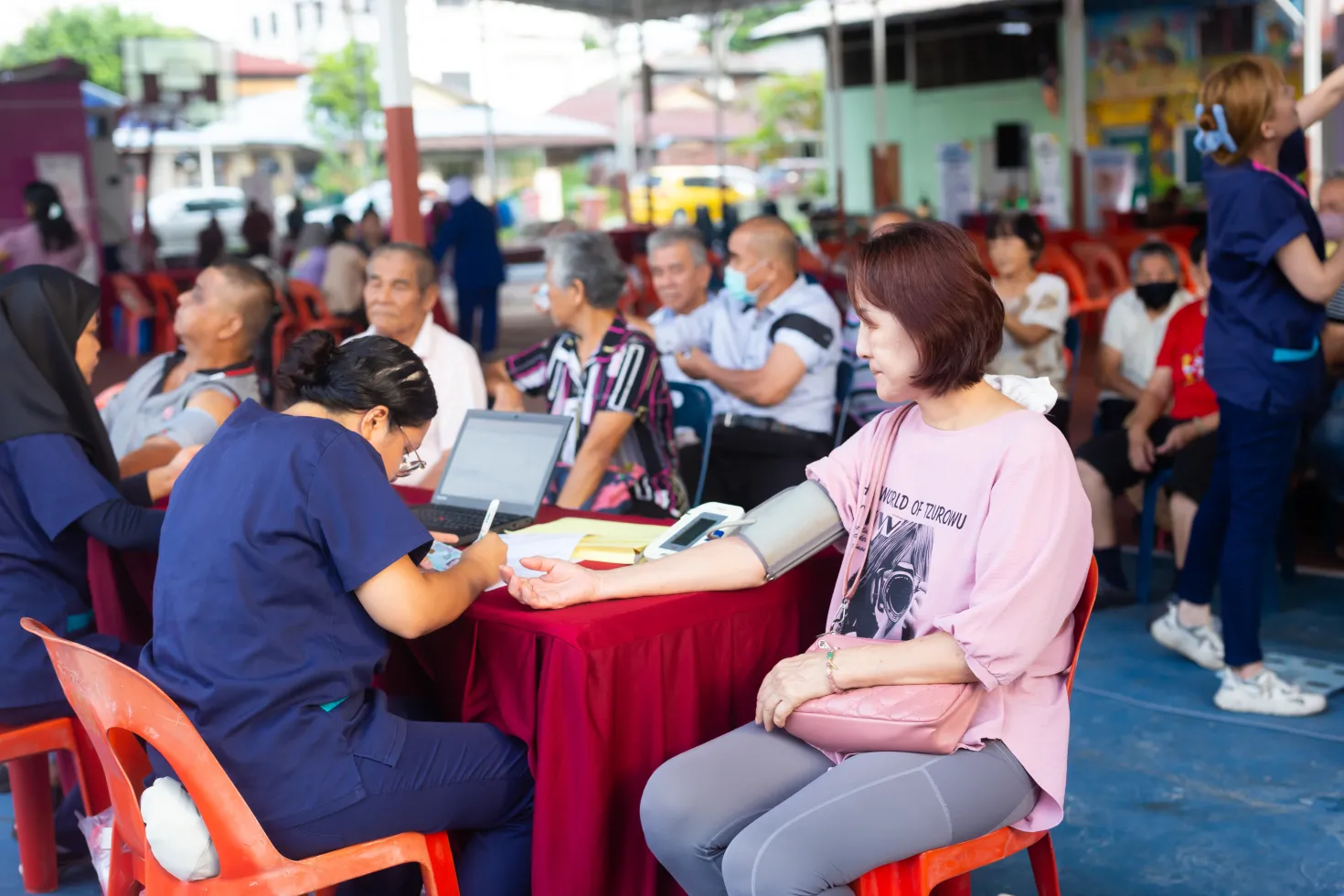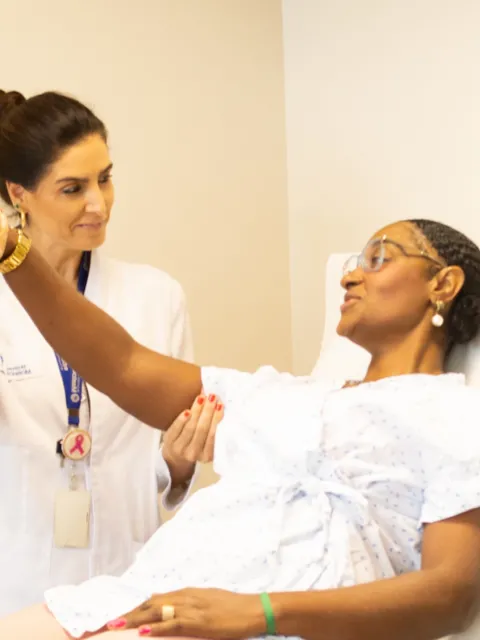UICC members in low resource settings improve early diagnosis of breast cancer
UICC member organisations in Jordan, Malaysia, and Kyrgyzstan are improving the early detection and diagnosis of breast cancer through locally adapted training, referral systems, and outreach, supported by grants through UICC’s Breast Cancer programme.

Universiti Malaya is among 19 UICC member organisations who received a grant to improve the early detection of breast cancer in their region through action and advocacy. The public foundation Ergene in Kyrgyzstan and the Jordan Breast Cancer Programme are two other members featured in this article.
HIGHLIGHTS
-
Projects funded through UICC's were funded for a period of one year, with measurable results. Common success factors included primary care training, patient navigation, and advocacy to shift policy focus from curative to preventive care.
-
In Jordan, four workshops led by the Jordan Breast Cancer Programme trained 96 key stakeholders and reached 500,000 people, improving coordination and early detection services.
-
Malaysia’s Universiti of Malaya project trained 123 providers, enhanced MoH facilities to conduct 5,273 clinical exams, and referred 197 women for diagnosis, helping shape district and state planning.
-
In Kyrgyzstan, Ergene’s mobile mammography initiative trained 188 health workers and referred 3,950 women, diagnosing 22 with early-stage cancer in a region previously detecting almost none.
UICC members in Jordan, Malaysia, and Kyrgyzstan are driving progress in early breast cancer detection by training frontline health workers, streamlining referral systems and engaging communities with tailored outreach.
Reem Al-Ajlouni from the Jordan Breast Cancer Programme, Prof. Nur Aishah Mohd Taib from the Universiti of Malaya, and Tynara Kasymalieva from Ergene in Kyrgyzstan spoke with UICC about how their initiatives, supported by grants through UICC’s Breast Cancer programme, are helping to build awareness and close the gap in access to timely diagnosis.
In Jordan, the Jordan Breast Cancer Programme (JBCP) has gradually shifted its focus from increasing the availability of services to ensuring people can access and move through them more effectively.
“We have mammography machines, breast clinics, and diagnostic units,” said Reem Al-Ajlouni, Director of JBCP. “What is needed now is making sure people know about them and access them. It’s about how people understand the system, and how the system responds to their needs.”
To address this, JBCP delivered a series of four tailored workshops for policymakers, media, community organisers, and healthcare workers in the country’s southern governorates. We worked with the media to ensure messaging was consistent, with policymakers to raise the issue politically, and with local providers to build capacity,” said Al-Ajlouni. A total 96 individuals participated in various workshops on raising awareness, with subsequent public awareness campaigns estimated to have reached around half a million people.
The programme also helped improve coordination among facilities and brought in new diagnostic equipment for under-resourced areas. “The idea is to shift early detection from merely a national-level policy idea to something real and that actually works on the ground,” she said.
Shifting health systems towards a more people-centred approach to service delivery
Like JBCP, teams in Malaysia and Kyrgyzstan demonstrated that improving early detection requires more than just equipment, it demands a practical redesign of how patients move through the system.
In Malaysia, REBUNG (Reducing Barriers in Cancer Early Diagnosis amongst B40 group) a project led by the Universiti of Malaya set out to reduce delays in diagnosis among low-income women in urban areas, where early signs of breast cancer often went unnoticed or unaddressed.
“A key focus was strengthening healthcare provider competencies, strengthening referral networks and improving patient experience in the diagnostic process,” said Prof. Nur Aishah Mohd Taib, a senior consultant breast surgeon and Professor of the Department of Surgery at the Universiti of Malaya.
“Each step of the assessment is designed to detect different abnormalities, helping to avoid missed or delayed diagnoses,” she explained. “Unfortunately, symptom recognition is often poor in primary care, especially for younger women and those who are pregnant or breastfeeding. It’s quite sad when a woman has seen a doctor, but the assessment was not performed rigorously enough, and her symptoms were downplayed.”
To address these barriers to care, the team at Universiti Malaya trained 123 primary health care workers to improve skills in recognising early symptoms of breast cancer, carrying out basic screening, providing enhanced access to private sector mammograms in public community clinics and ensuring timely referrals for further diagnosis and possible treatment.
The team also translated materials not only into Malay language but also Mandarin to help reach Chinese-speaking communities, and worked with local clinics to bring breast health education into regular checkups, so women could access information and support more easily.
Over the course of the project, more than 5,000 women received clinical breast examinations, with 197 referred for diagnosis, out of which 32 were directed to treatment. The project’s design and results also informed district-level rollout and were later taken up into state-wide planning by public health authorities.
Mobile teams and local trust
Naryn is a sparsely populated mountainous region of Kyrgyzstan, where the NGO Ergene is tackling one of the most persistent challenges in early detection: reaching women in remote areas.
Founded in 2006, Ergene is dedicated to improving cancer care and public health in Kyrgyzstan. It has become a trusted partner to national health institutions, and the only NGO in Kyrgyzstan that provides the Ministry of Health and the National Oncology Institute with technical support on breast cancer issues.
It played a significant role in introducing diagnostic tools, developing clinical guidelines, and training local providers for breast health.
“We were working with the system already on guidelines, on training, on awareness,” said Tynara Kasymalieva, Coordinator of the Public Foundation Ergene who manages their mobile mammography work and is herself a breast cancer survivor. “But access in remote areas was still a problem. That’s why we proposed the mobile unit - so women wouldn’t have to travel far just to get screened.” Taalaigul Sabyrbekova, Founder of Ergene, and Tatiana Soldak, Member of the Board of Directors, also took part in the discussion with UICC.
Ergene’s project in early detection, funded like the others by a grant awarded through UICC’s Breast Cancer programme, brought mammography services directly to women, with mobile teams working alongside the existing network of family doctors and nurses.
“At first, some clinics were hesitant, they saw us as competitors, they were worried the mobile team might duplicate their efforts or take over their patients,” said Sabyrbekova. “When we explained the model and clarified everyone’s roles, however, they agreed to work together.”
Ergene also coordinated with local clinics in advance, and trained local health workers, including family doctors and nurses, to perform clinical breast exams, and identify women who might need further screening. “
This allowed the mobile team to focus mammography services where they were most needed,” said Sabyrbekova. “We didn’t want to work separately. The whole point was to connect the system so that family doctors could guide the women and follow up with them afterwards.”
The mobile mammography team would then travel to the area and set up near the health facility, allowing women to be tested without having to travel long distances.
UICC’s grant covered a period of one year, and in this time the project trained 188 primary care providers and examined 18,350 women, with nearly 4,000 referred for further screening. Of those, 132 had a biopsy within 60 days, leading to 22 early-stage cancer diagnoses, a major improvement in a region where only one woman had been diagnosed the previous year.
All three projects, despite different settings, relied on a similar mix of practical strategies: training frontline providers, helping people with cancer navigate services, and pushing for system-level changes. Multilingual materials, clearer referral pathways, mobile services, and coordinated follow-up all helped women move more reliably through the diagnostic process.
As Al-Ajlouni said: “Our health system is not proactive: 70% of resources go to curative care, not preventive care. So the argument we have around cancer prevention and early detection is not easy. But we are making progress.”
Further information on these projects and others is available on UICC's case study pages
Last update
Tuesday 21 October 2025
